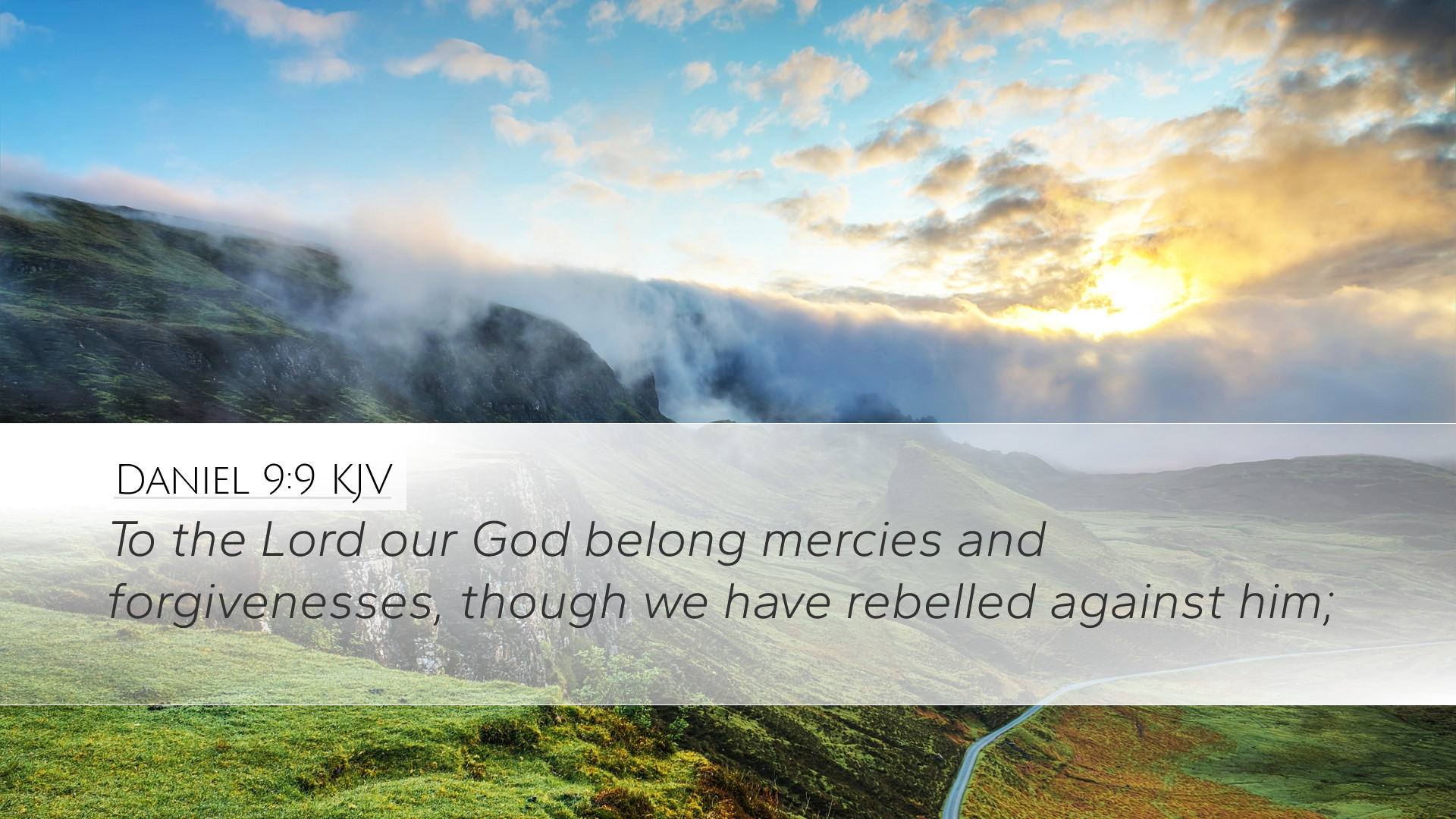Commentary on Daniel 9:9
In Daniel 9:9, we find a profound expression of God's mercy and forgiveness, standing in stark contrast to humanity's sinfulness. The verse reads:
"To the Lord our God belong mercies and forgivenesses, though we have rebelled against him."
General Overview
This verse encapsulates the essence of God's character as a merciful and forgiving God. Daniel, in his prayer, acknowledges the persistent rebellion of Israel while simultaneously extolling the unfailing mercy of God. The juxtaposition of human sinfulness and divine grace is a central theme throughout the Scriptures.
Insights from Public Domain Commentaries
Matthew Henry's Commentary
Matthew Henry emphasizes the dependence of humanity on God's mercy. He points out that Daniel begins his prayer by recognizing that mercy and forgiveness originate solely from God. Henry notes the importance of this acknowledgment, as it sets the tone for true repentance. He explains that while it is easy to dwell on human failures, it is essential to remember that God’s mercy is greater than human sin.
Mercies and Forgiveness
Henry elaborates on the nature of God’s mercy, highlighting that it is abundant and accessible. He states:
"Mercies and forgivenesses, plural, to signify the manifold acts of divine kindness and the many forms of pardon that our God is willing to extend."
This plurality serves as a reminder that God’s willingness to forgive is limitless, urging believers to come to Him in repentance.
Albert Barnes' Notes on the Bible
Albert Barnes presents a contextual analysis of the verse, suggesting it reflects not only the personal prayer of Daniel but also Israel’s national crisis. He draws attention to the collective sin of the people, invoking the understanding that they collectively and repeatedly turned away from God.
Understanding Rebellion
Barnes states, "The acknowledgment of rebellion is the first step towards receiving mercy." He highlights the importance of confession, as true repentance involves recognizing one's own sinfulness. He suggests that when we confess our sins and acknowledge our rebellion, we position ourselves to receive God’s forgiveness.
Adam Clarke's Commentary
Adam Clarke emphasizes the covenant relationship between God and Israel. In his exposition, he highlights that God's mercy is a direct outflow of His covenant faithfulness. Clarke points out:
"God's promises are ever in accordance with His nature, thus His mercies are new every morning, and His faithfulness endures through all generations."
This ties into the overarching narrative of salvation history, where God continually invites His people back into relationship despite their repeated failures.
The Nature of God’s Forgiveness
Clarke also underscores that forgiveness is not merely the act of overlooking sin, but a profound restoration of relationship. He explains that God's forgiveness transforms the sinner, enabling a true return to holiness and intimacy with the Divine:
"Forgiveness reinstates the soul into communion with God; it is the cleansing of the conscience to enable man to serve God acceptably."
Theological Implications
The theological implications of Daniel 9:9 are pivotal for understanding the nature of God in relation to humanity's sin. First and foremost, this verse highlights God's character as merciful and gracious.
- Divine Mercy: The text affirms that mercy is intrinsic to God's nature. This understanding encourages believers to approach God with the confidence that He is ready to forgive.
- Confronting Rebellion: Acknowledging rebellion is crucial in the life of faith. It calls for constant self-examination and a humble heart before God.
- Restorative Forgiveness: God's forgiveness is transformative, not merely dismissive. It leads to restoration, reconciliation, and renewed purpose.
- Invitation to Repentance: This verse serves as an invitation for all believers to seek the Lord earnestly, acknowledging their faults while resting in His merciful nature.
Practical Applications
For pastors, students, and theologians, Daniel 9:9 serves as a robust framework for understanding and teaching about God's mercy and the human condition. This verse can be used in various practical contexts:
- Preaching on Repentance: Incorporate this verse into sermons aimed at encouraging congregations to embrace humility and repentance.
- Spiritual Counseling: Use this verse to provide hope during counseling sessions, reminding individuals that no sin is too great for God's forgiveness.
- Developing Lay Leadership: Teach lay leaders about the importance of recognizing and acknowledging personal and corporate sin as a precursor to experiencing God’s grace.
- Bible Study Groups: Engage in discussions about God's character using this verse; strive to explore how God’s mercy shapes our understanding of community and fellowship.
Conclusion
Daniel 9:9 offers profound reflections on the nature of God as merciful and forgiving. The interplay between divine mercy and human rebellion highlights the importance of confession and the transformative power of forgiveness. By understanding and embracing these truths, believers can cultivate deeper relationships with God, grounded in the assurance of His unwavering love and grace.


